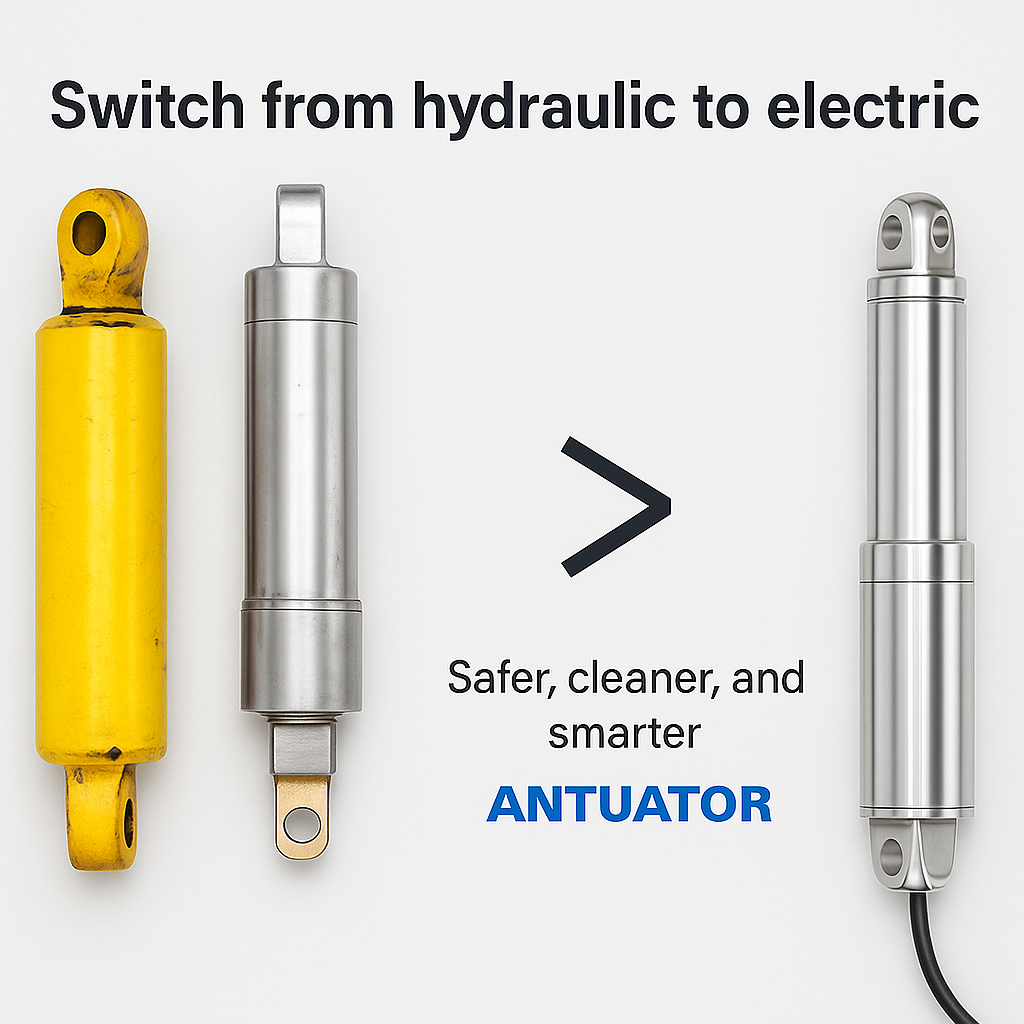Why More Industries Are Replacing Hydraulic and Pneumatic Systems with Electric Linear Actuators

As automation, smart control, and safety standards evolve, many industries are moving away from traditional hydraulic and pneumatic systems in favor of electric linear actuators — especially self-locking electric actuators. These advanced actuators are now widely used in outdoor equipment and industrial automation for their efficiency, reliability, and low maintenance. In this article, we’ll explore why electric actuators are quickly becoming the preferred choice, and how ANTUATOR's self-locking actuators deliver enhanced performance for modern applications. Hydraulic vs. Pneumatic vs. Electric Actuators — Why Self-Locking Is a Game Changer In conventional drive systems: Hydraulic actuators offer high force output but require complex piping, hydraulic pumps, and valves. They’re prone to leaks and involve high maintenance costs, with limited adaptability in harsh outdoor environments. Pneumatic actuators are fast but lack precision and self-locking capability. Once the air supply stops, the system can drop abruptly, posing safety risks. Electric linear actuators, especially those with self-locking mechanisms, maintain their position securely even without power — greatly improving safety, precision, and energy efficiency.
Key Advantages of Self-Locking Electric Linear Actuators
-Superior Safety: Self-locking actuators can hold loads firmly in place without power, preventing unintentional movements due to gravity or external forces.
-Energy-Efficient: Unlike hydraulic and pneumatic systems, which require continuous pressure or power to maintain positions, electric actuators consume energy only when in motion, reducing operational costs.
-Simplified Installation & Maintenance: No need for bulky hydraulic pumps, air compressors, or complicated brake systems — electric actuators offer a clean, compact, and low-maintenance solution.
Why Choose ANTUATOR’s Self-Locking Actuators?
While most linear actuators claim to offer self-locking, ANTUATOR’s solutions are engineered to perform reliably in the harshest real-world conditions. Key differentiators include: High-Precision Gear Systems for increased static load capacity. Multi-Scenario Environmental Testing, ensuring consistent self-locking performance in extreme temperatures, humidity, or coastal environments. Customizable Solutions tailored for RV roof lift systems, pergolas, louvers, marine equipment, and more.
Popular Application Scenarios :
RV Electric Roof Lift SystemsEnsures the pop-up roof remains securely in place while driving, with no risk of sagging or collapsing in transit. ANTUATOR’s electric actuators offer reliable power-off locking without the need for additional locks or clamps.
Bioclimatic Pergolas & Architectural LouversPrecision-controlled louvers and awnings can maintain their position even during power outages or strong winds, reducing the risk of property damage and improving energy efficiency.
Marine & Watersport EquipmentOn floating docks, boat lifts, or retractable water slides, external forces like waves and winds can compromise stability. ANTUATOR’s actuators lock structures securely in place, ensuring user safety.
Conclusion While self-locking isn’t a new feature in linear actuators, achieving reliable, real-world performance in demanding outdoor applications takes specialized engineering. ANTUATOR’s self-locking electric actuators are designed to hold firm when it matters most — providing a safer, smarter, and more energy-efficient alternative to hydraulic and pneumatic systems.
Contact us today for customized actuator solutions or technical consultation. Let’s make your automation projects safer and smarter. Learn more at: www.antuator.com